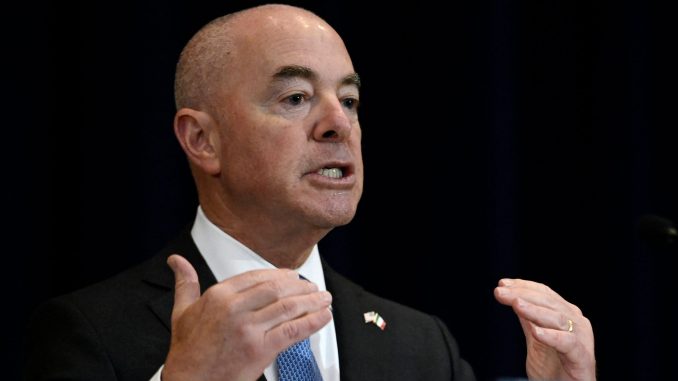
Despite plenty of negative media attention this year on the now-dissolved Disinformation Governance Board, government collusion with social media platforms is ramping up.
This collaboration between the Department of Homeland Security and companies such as Twitter and Facebook to police the speech of Americans requires a legislative remedy.
On Halloween, a concerning report in The Intercept detailed just how scary the scope and capacity of these disinformation efforts are. Citing leaked DHS documents, the article stated:
According to a draft copy of DHS’s Quadrennial Homeland Security Review, DHS’s capstone report outlining the department’s strategy and priorities in the coming years, the department plans to target ‘inaccurate information’ on a wide range of topics, including ‘the origins of the COVID-19 pandemic and the efficacy of COVID-19 vaccines, racial justice, U.S. withdrawal from Afghanistan, and the nature of U.S. support to Ukraine.’
During the George W. Bush administration, Congress created the Department of Homeland Security in the aftermath of the 9/11 terrorist attacks to protect the homeland—not to monitor Americans’ free speech.
Considering The Intercept’s revelations about the Department of Homeland Security’s formal effort to coordinate censorship with technology platforms, it is clear the department instead is concerned with alleged threats from Americans themselves. While the department no longer maintains an official Disinformation Governance Board, President Joe Biden and Homeland Security Secretary Alejandro Mayorkas rely on informal working groups and private companies to enforce political suppression of speech.
Government agencies—in particular, the Department of Homeland Security, especially through its Cybersecurity and Infrastructure Security Agency as well as the FBI—have been in this business of arbitrating what is true and false for some time now, dating back to the early 2000s.
However, today’s censorship and propaganda are growing at a rate we’ve never experienced before. Big Tech gives our government the tools to be dangerously effective in their efforts.
According to the leaked DHS documents in The Intercept’s report, third-party entities such as Facebook and Twitter are willing “clearing houses” that funnel information to the public to “avoid the appearance of government propaganda.”
Both Facebook and Twitter created online portals where government agents submitted, and perhaps still submit, censorship directives for official corporate action. These relationships reflect a coordinated campaign to promote a certain definition of truth and solidify the power of the Biden administration, and Big Tech’s participation undermines its claim to offer neutral platforms.
Government agencies allege that submitting reports of disinformation threats to private social media platforms gives those companies the freedom to act or not. Evidence shows otherwise: An established pattern exists of clear expectations to censor, as well as working relationships between these public and private entities.
In August, Facebook founder Mark Zuckerberg revealed that his company had censored stories about Hunter Biden’s laptop at the request of the FBI just before the 2020 presidential election. Now, because of The Intercept’s report, we read text messages between Microsoft executives and government officials revealing that allegedly neutral internet companies are more than willing to do the government’s dirty work to dismantle information that doesn’t support the Biden administration.
Matthew Masterson, a Microsoft representative who formerly worked at the Cybersecurity and Infrastructure Security Agency, told the head of that agency in a February text that “platforms have got to get comfortable with gov’t.”
Jen Easterly, appointed by Biden to head the Cybersecurity and Infrastructure Security Agency, likely was pleased. Easterly’s prior text to Masterson stated that she is “trying to get us in a place where Fed can work with platforms to better understand mis/dis trends so relevant agencies can try to prebunk/debunk as useful.”
This collusion between a Big Tech company and a government official reveals the extent to which an oligarchic few control public information. A dangerous precedent has been set, and it must be reversed quickly by the people’s elected representatives.
The Intercept’s report should inform future lawmaking on the liability protections enjoyed by internet platforms because of Section 230 of the Communications Decency Act. As written, Section 230 gives tech executives the latitude to paint censorship with the broad brush of “misinformation.”
Although some lawmakers, including Sen. Ron Johnson, R-Wis., have scrutinized social media’s discriminatory censorship, all lawmakers must take action to make tech companies liable for instances of political censorship.
Congress must conduct significant oversight of the Cybersecurity and Infrastructure Security Agency, other agencies, and tech companies’ interactions with them—and also defund their bogus misinformation cronyism.
Once this disinformation work is dismantled, legislators should reexamine the Cybersecurity and Infrastructure Security Agency Act and the law that created it, to rein in any authority that can be exploited for content moderation and to prevent deviance from the clear mission to secure the homeland.
We can’t rely on tech policy by leak any more than we can wait for the next brave whistleblower to testify in Congress. The time for transparency and accountability for internet platforms is long overdue.
Have an opinion about this article? To sound off, please email letters@DailySignal.com and we’ll consider publishing your edited remarks in our regular “We Hear You” feature. Remember to include the url or headline of the article plus your name and town and/or state.

